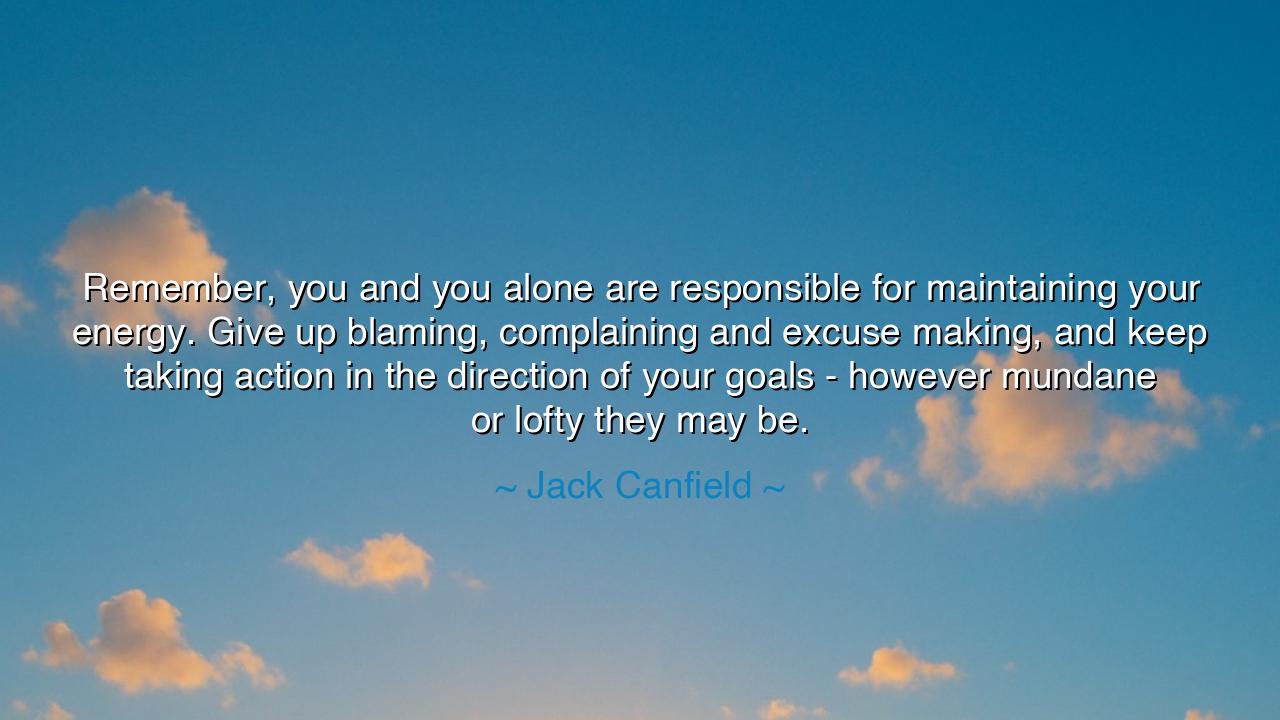
Remember, you and you alone are responsible for maintaining your
Remember, you and you alone are responsible for maintaining your energy. Give up blaming, complaining and excuse making, and keep taking action in the direction of your goals - however mundane or lofty they may be.






"Remember, you and you alone are responsible for maintaining your energy. Give up blaming, complaining and excuse making, and keep taking action in the direction of your goals - however mundane or lofty they may be." These wise words by Jack Canfield speak directly to the heart of human empowerment and the essential truth that our energy, our will, and our actions are within our control. Canfield’s message is clear: we are the architects of our own lives, and it is only through our own actions that we can shape our futures. No one but ourselves is responsible for the energy we bring into our endeavors, and it is through the relentless pursuit of our goals, free from blame and excuses, that we reach the heights of success—whether those goals are grand or humble.
In the ancient world, the concept of personal responsibility was a pillar of wisdom. Socrates, in his pursuit of knowledge, famously declared that "the unexamined life is not worth living." His philosophy urged individuals to take personal responsibility for their actions, their thoughts, and their direction in life. The Greeks believed that to live a life of virtue and honor meant to embrace one’s own agency—to recognize that we, as individuals, are the ones who decide our path, no matter the circumstances. Just as the warrior in battle is responsible for his sword, so too is the individual responsible for the energy they wield in their own life.
In a similar vein, Marcus Aurelius, the Roman Emperor and Stoic philosopher, wrote extensively on personal control and action in the face of adversity. In his Meditations, he reflects that no matter the obstacles we face, it is our duty to maintain our integrity and resolve, for the power to overcome lies within us. He taught that we must reframe the challenges before us, not as burdens but as opportunities to demonstrate strength, courage, and self-control. For Marcus, complaining and excuses were not the path to greatness, but action and perseverance in the face of hardship. His life is a testament to the idea that, in the end, it is we alone who hold the key to our energy and outcomes.
Take the example of Thomas Edison, the great inventor. Edison’s journey was not one of immediate success but a series of failures and setbacks. However, he never wavered in his commitment to his vision. Instead of blaming circumstances or making excuses for his failures, Edison simply kept working, relentlessly pursuing his goals despite the doubts and difficulties that arose. His famous words, “I have not failed. I've just found 10,000 ways that won't work,” encapsulate his determination to keep taking action, no matter how many times he stumbled. His energy, his focus, and his commitment were his own responsibility, and it was these qualities that led him to eventually bring the world the electric light bulb—a goal that once seemed impossible.
Canfield’s message echoes throughout history: we are the masters of our own fate. The energy we put into our actions is a reflection of our internal resolve. If we are constantly complaining, blaming others, or making excuses, we relinquish our power and allow external forces to dictate the course of our lives. But when we take full responsibility for our actions, we not only control our energy but also focus it on creating the life we desire. The ancient wisdom teaches us that action is the antidote to powerlessness. To keep moving toward our goals, no matter how mundane or lofty, is the path to progress.
The lesson here is one of self-mastery and perseverance. Just as the ancient philosophers taught the importance of controlling the mind and spirit, Canfield reminds us that we must also control our energy and action. The road to achieving our goals is rarely smooth or easy. There will be obstacles, distractions, and moments of doubt, but the key is in how we respond. Do we complain, do we blame, do we make excuses, or do we take responsible action, no matter how small, every day? Like Edison, we must see each failure not as a sign of defeat, but as a step toward success.
In our own lives, let us follow this ancient and modern wisdom. We must take full responsibility for our energy, for the way we engage with the world, and for the goals we pursue. Let us not waste our time on the frivolous distractions of complaining or blaming others, but rather invest in consistent action, no matter how insignificant it may seem at the moment. Whether our dreams are small or grand, we must move in their direction, steadily, with purpose, knowing that every step forward brings us closer to what we seek. We hold the key to our own success—through the energy we invest, the choices we make, and the action we take. Let this be our guiding principle in all things.






AAdministratorAdministrator
Welcome, honored guests. Please leave a comment, we will respond soon